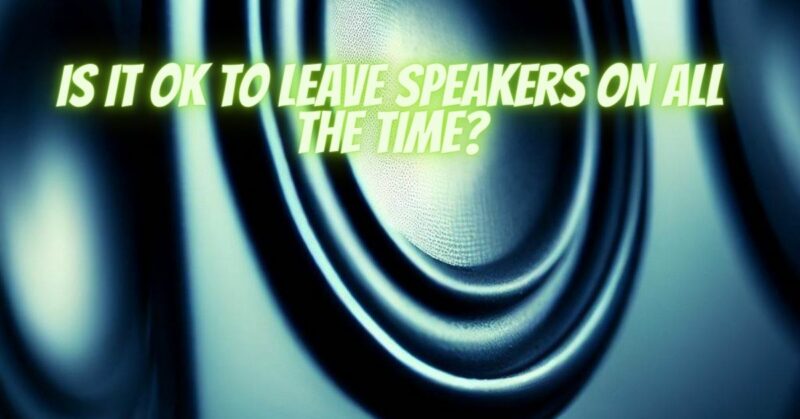The question of whether it is acceptable to leave speakers on all the time is a common concern among audio enthusiasts. On one hand, keeping the speakers powered continuously ensures instant audio availability and eliminates the hassle of repeatedly turning them on and off. On the other hand, some worry about the potential risks and energy consumption associated with leaving speakers powered constantly. In this article, we will explore the pros and cons of leaving speakers on all the time to help you make an informed decision.
- The Pros of Leaving Speakers On
a. Instant Audio Availability: Keeping speakers on all the time means audio is readily available whenever you wish to use them. You can start playing music or audio without any delay, enhancing convenience and user experience.
b. Reduced Wear and Tear: Frequent powering on and off of speakers can result in wear and tear on the internal components, such as capacitors and switches. Leaving them powered continuously reduces this wear and extends the overall lifespan of the speakers.
c. Speaker Warm-Up: Some audio enthusiasts believe that leaving speakers on all the time allows them to “warm up” and perform at their best, claiming that the continuous flow of electricity optimizes the components’ performance.
- The Cons of Leaving Speakers On
a. Energy Consumption: Leaving speakers on all the time can lead to increased energy consumption. While modern speakers are generally energy-efficient, the cumulative impact of continuous power usage might be a concern for those conscious of their carbon footprint.
b. Potential Speaker Damage: In rare cases, if speakers are not well-ventilated or suffer from design flaws, leaving them powered constantly may lead to overheating, which can damage internal components. This risk is minimal with well-designed and high-quality speakers.
c. Noise and Disturbance: If speakers are left on in a room where silence is desired, such as a bedroom or study, they may create background noise that could be distracting or disruptive.
- Finding a Balance
To find a balance between convenience and energy efficiency, consider the following tips:
a. Use Standby Mode: Many modern speakers come with standby mode, which reduces power consumption when not in use. Utilize this feature to conserve energy while still having instant audio availability.
b. Automate Power: Invest in smart plugs or power strips with timer functions, allowing you to automate the power on and off schedule for your speakers, ensuring they are not left on when unnecessary.
c. Monitor Speaker Temperature: Keep an eye on the temperature of your speakers, especially if they are always powered. If they feel excessively warm, consider adjusting their placement or providing better ventilation.
d. Consider Eco-Friendly Options: If energy consumption is a concern, opt for energy-efficient speakers and amplifiers that meet modern efficiency standards.
- Speaker Lifespan and Usage Habits
It’s important to remember that the lifespan of speakers is influenced by various factors beyond continuous power. Responsible usage, proper maintenance, and moderate volume levels all contribute to preserving the longevity of your speakers.
Whether to leave speakers on all the time depends on individual preferences, usage patterns, and environmental considerations. While there are benefits to continuous power, such as instant audio availability and reduced wear and tear, there are also potential downsides, including increased energy consumption and a minimal risk of overheating. By finding a balance between convenience and energy efficiency, monitoring speaker temperature, and employing smart power management solutions, you can make an informed decision that suits your audio needs while ensuring the longevity of your speakers.


